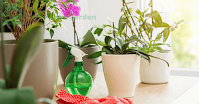How to Care for Plants at Home: Essential Tips for a Healthy Indoor Garden
Having plants in your home is a wonderful way to bring nature into your environment, improve air quality and add a touch of green beauty to your decor. However, for your plants to thrive, knowing how to care for them properly is critical. In this article, we'll explore valuable tips on how to care for plants at home, from choosing the right plants to watering, fertilizing and more, to ensure your indoor garden is healthy and lush.
The importance of caring for plants at home
Before we dive into the practical tips, it's important to understand why home plant care is so important:
Improved Air Quality: Plants help purify the air by removing pollutants and releasing oxygen during photosynthesis.
Mental Well-Being: Having plants at home can reduce stress, improve mood and create a more relaxing and enjoyable environment.
Natural Decor: Plants add beauty and vitality to your decor, making the space more attractive.
Connection with Nature: Caring for plants provides a direct connection with nature, even in urban environments.
Understood the importance, let's go to the practical tips on how to take care of your plants at home.
Tips on How to Care for Plants at Home
1. Choose the Right Plants
How do I choose the right plants for my home?
Consider the lighting, humidity, and space conditions in your home. Some plants, like succulents and cacti, are ideal for environments with indirect light, while others, like ferns, prefer more humid places, like the bathroom.
2. Know Your Water Needs
How do I know when to water my plants?
Check the soil moisture by placing your finger about 2-3 centimeters below the surface. If the soil is dry, it's time to water. Keep in mind that watering frequency will vary depending on the type of plant and the conditions in your home.
3. Provide Good Drainage
Why is drainage important for potted plants?
Make sure the pots have drainage holes to prevent excess water from accumulating which can lead to root rot. Use vases with small plates to collect excess water and avoid leaving the roots of your plants standing in the water.
4. Adequate Lighting
How do I provide the right lighting for my houseplants?
Understand the light needs of your plants. Most plants need bright indirect light, but avoid intense direct sunlight, which can burn the leaves. Rotate your plants periodically to ensure even growth.
5. Avoid Excess Fertilizer
How often should I fertilize my houseplants?
Avoid overfertilizing, which can harm the plants. Follow the fertilizer instructions and fertilize less frequently during the winter when growth is slower.
6. Regular Cleaning and Maintenance
How to keep my plants healthy?
Remove dead or withered leaves and wipe the dust off the leaves with a damp cloth to allow the plants to breathe and absorb light efficiently.
7. Avoid Pests and Diseases
How can I protect my plants from pests and diseases?
Regularly inspect your plants for signs of pests such as insects or leaf spots.infected plants immediately to prevent the spread of pests. Use organic control measures, such as applying neem oil or soapy water, to eliminate pests. Keep your plants in clean, well-ventilated rooms to reduce the risk of fungal diseases.
8. Transplant when Necessary
When should I replant my plants?
Transplant your plants into larger pots or change the soil when they get too big for their current pot or have visibly compacted roots.
Faqs about Home Plant Care
Can I use tap water to water my plants at home?
Most plants tolerate tap water, but some can be sensitive to chlorine. Let the water rest for a few hours before using it for watering, or use filtered water.
What are the best plants for beginners in home plant care?
Plants like succulents, cacti, pothos, and the ZZ plant are great choices for beginners as they are hardy and require less attention.
How can I increase the humidity for plants that need a humid environment?
Place the plants in a dish with gravel and water, use a humidifier or mist the leaves regularly to increase the humidity around the plants.
What is the best way to prune my houseplants?
Use clean, sharp pruning shears or shears to remove dead or diseased leaves. Cut close to the main stem or branch without damaging healthy tissue.
Can I use crushed eggshells as fertilizer for my plants?
Yes, crushed eggshells are a source of calcium and can be used as an organic fertilizer to provide nutrients to plants.
Conclusion
Taking care of plants at home is a rewarding activity that brings benefits to the health, well-being and aesthetics of your home. With the tips on how to care for plants at home and the knowledge of the FAQs covered in this article, you're ready to create a healthy and lush indoor garden. Remember that each plant is unique, so watch them closely and adjust your care as needed. With dedication and attention, you will be able to enjoy a greener and more vibrant environment in your home. Enjoy the process of caring for your plants and allow them to bring the beauty of nature into your home.


